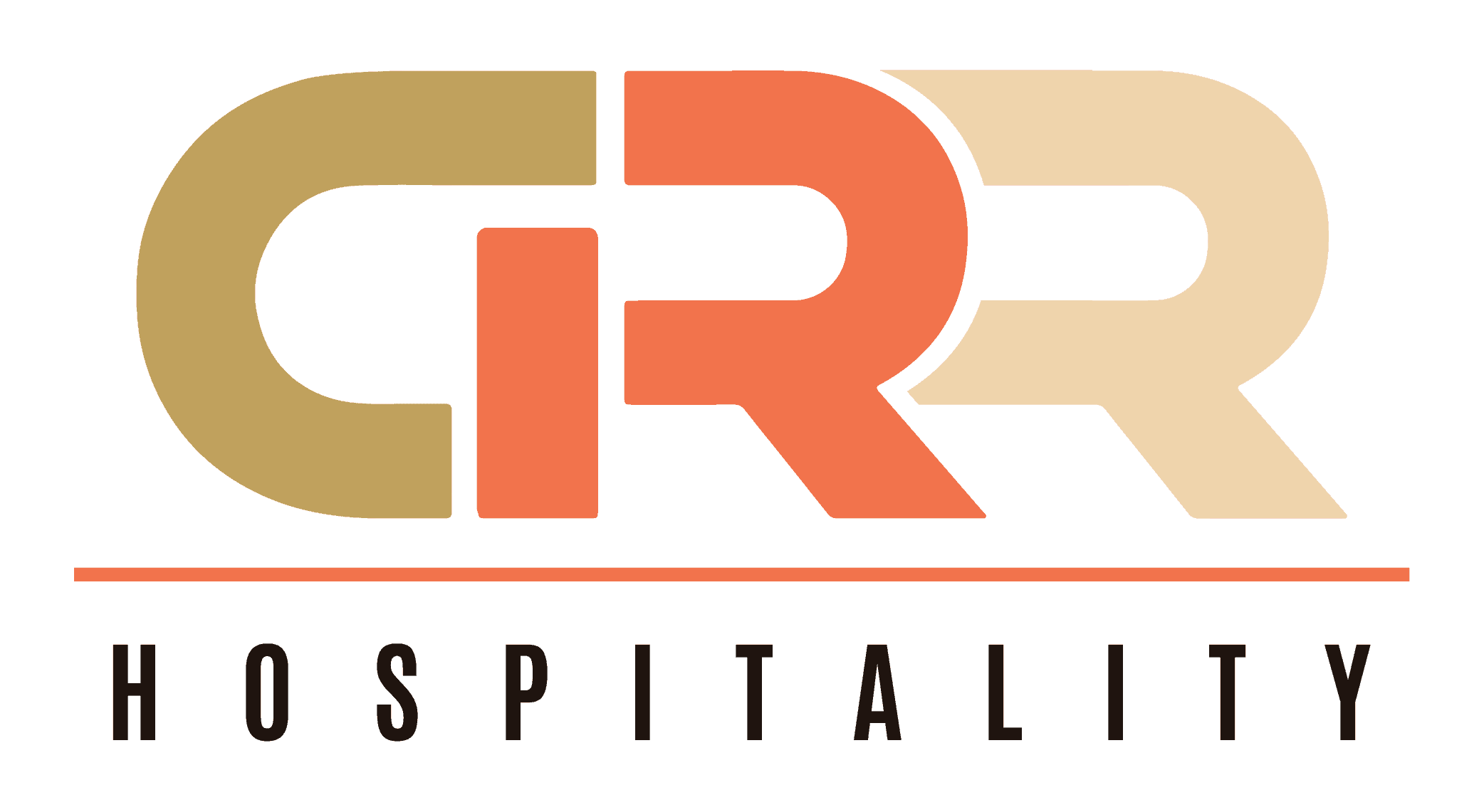Building strong supplier relationships is crucial for the success of any RV park. Establishing reliable partnerships with suppliers can help ensure operational excellence and high levels of guest satisfaction.
In this article, we’ll explore the importance of RV park supplier relationships and provide insights on how to manage these relationships effectively. From understanding the role of suppliers to negotiating win-win agreements, we’ll cover all the essential aspects of supplier relationship management in the RV park industry.
Key Takeaways:
- Strong supplier relationships contribute to operational excellence and guest satisfaction in RV parks.
- RV park suppliers play a significant role in the overall success of an RV park.
- Effective communication, trust-building, and vendor evaluation are crucial in managing RV park supplier relationships.
- Selecting the right suppliers and negotiating win-win agreements are essential to establishing long-lasting partnerships.
- Leveraging technology and embracing a culture of innovation can help improve supplier relationships in RV parks.
Understanding the Role of RV Park Suppliers
RV park suppliers serve a critical role in the success of an RV park. From providing essential goods and services to contributing to guest satisfaction, these suppliers have a significant impact on operations. To fully leverage their value, it is necessary to establish strong partnerships with them that foster mutual trust and collaboration.
RV park supplier partnerships enable businesses to better meet the needs of their guests by ensuring that they have access to high-quality, reliable products and services. Suppliers can support RV parks in a range of areas, including maintenance, housekeeping, and food and beverage services. By working in close collaboration, suppliers can better understand the unique needs and challenges of an RV park and provide tailored solutions that meet these requirements.
Effective supplier partnerships require ongoing communication and collaboration. RV park owners and operators need to work closely with suppliers to establish clear expectations, provide feedback, and address any concerns that may arise. By doing so, they can ensure that both parties are aligned in their goals and working towards a common objective.
Managing RV Park Supplier Relationships
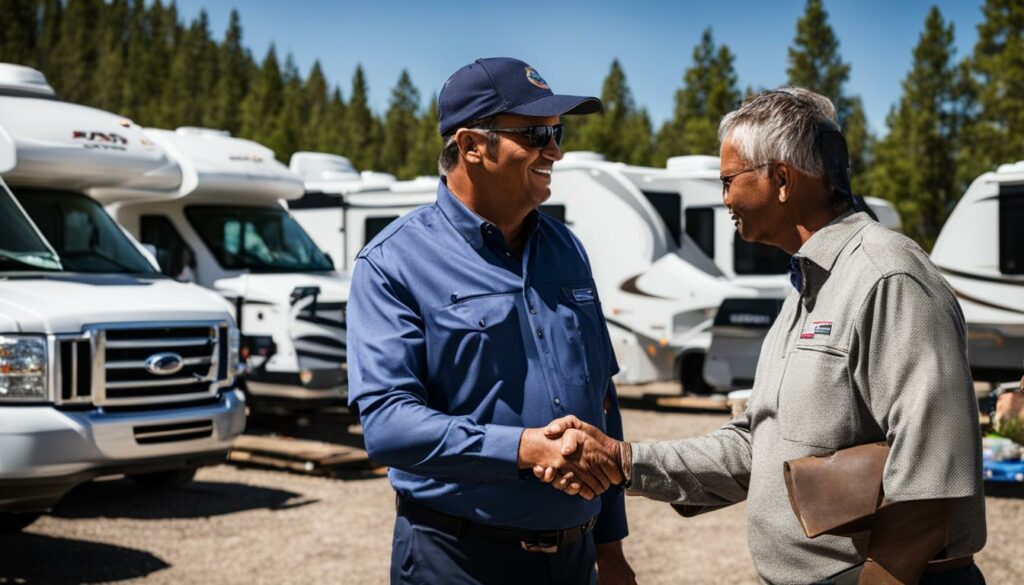
Effectively managing supplier relationships is key to optimizing supplier partnerships in RV parks. This involves implementing strategies and best practices across a range of areas, including communication, negotiation, and performance evaluation.
Communication
Communication is a vital component of managing RV park supplier relationships. It is important to establish clear channels of communication with suppliers to ensure that expectations are met and issues are resolved in a timely manner. Utilizing technology such as email, videoconferencing, and messaging apps can enhance communication efficiency. Providing suppliers with regular updates and feedback can also aid in building trust and rapport.
Negotiation
Successful negotiation with suppliers can lead to mutually beneficial agreements that contribute to RV park success. When negotiating, it is essential to focus on achieving a win-win outcome that considers the interests of both parties. Establish clear objectives and priorities, and be ready to compromise when necessary.
Performance Evaluation
Regular evaluation of supplier performance is important for ensuring quality and efficiency in RV park operations. Establishing clear criteria for performance evaluation and communicating them to suppliers can motivate them to maintain high standards. Use tools such as scorecards and audits to track and measure supplier performance, and provide feedback and coaching to improve results.
Implementing these strategies for managing supplier relationships in RV parks can enhance supplier partnerships, leading to improved operational performance and guest satisfaction. Continuously evaluating and refining supplier management processes is key to optimizing supplier relationships and contributing to the overall success of the RV park industry.
Choosing the Right Suppliers for Your RV Park
Enhancing supplier partnerships in the RV park industry is crucial for the success of any RV park. And selecting the right suppliers is a critical step in achieving that goal. Here are some essential factors to consider when choosing suppliers for your RV park:
| Factor | Description |
|---|---|
| Quality | Look for suppliers that offer high-quality products and services that align with your RV park’s standards and guest needs. |
| Reliability | Choose suppliers that have a proven track record of delivering products and services on time and without error. Dependable suppliers can help minimize downtime and improve guest experiences. |
| Cost-effectiveness | Consider the cost of working with different suppliers and the value they provide. Look for suppliers that offer competitive pricing without sacrificing quality or reliability. |
| Flexibility | Seek out suppliers that are open to adapting their products or services to meet your unique needs as an RV park. They may be more willing to work with you on pricing and other terms. |
| Compatibility | Ensure that your selected suppliers share your commitment to guest satisfaction and operational excellence. A shared vision and values can help facilitate a successful and fruitful partnership. |
By taking these factors into account and carefully vetting potential suppliers, RV park owners and operators can establish lasting relationships that contribute to their overall success. Remember to continue evaluating and optimizing supplier partnerships over time to ensure they continue to align with your RV park’s evolving needs and goals.
Establishing Clear Expectations with Suppliers
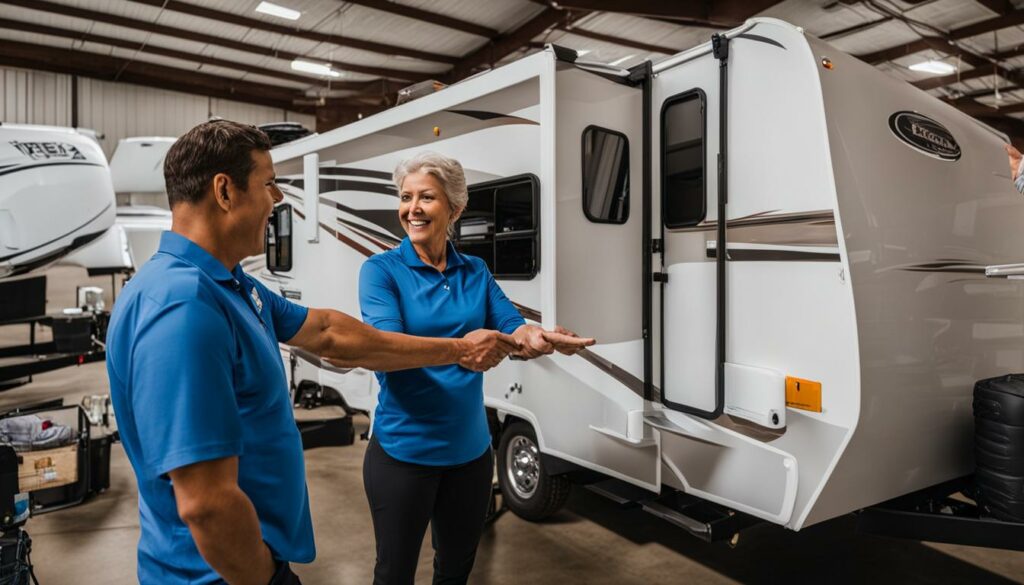
Clear communication is a critical component of building strong supplier relationships in the RV park industry. Establishing clear expectations with suppliers promotes mutual understanding and helps to avoid misunderstandings, rework, and delays.
Service level agreements (SLAs) are a vital communication tool for setting expectations with suppliers. SLAs document the agreed-upon service level expectations, including delivery timelines, quality standards, and support procedures. By defining the scope of services, SLAs help RV park staff assess supplier performance and address issues that may arise.
Delivery timelines are another critical expectation-setting factor. By providing a clear timeline for delivery, RV park staff can accurately plan inventory levels and ensure they have the products and services they need when they need them. Suppliers who consistently meet or exceed delivery timelines can help improve the RV park’s operational efficiency and customer satisfaction.
Finally, defining quality standards is essential to ensure that suppliers meet the RV park’s quality expectations. RV park staff should define quality standards by outlining the expectations for product quality, packaging, and care during delivery. Defining clear standards will enable suppliers to comply with expectations, reduce errors, and improve the likelihood of receiving high-quality products and services.
Establishing Clear Expectations with Suppliers – Table 5.1
| Expectation | Description |
|---|---|
| Service level agreement (SLA) | A document outlining agreed-upon service level expectations, including delivery timelines, quality standards, and support procedures. |
| Delivery timelines | A clear timeline for delivery, enabling RV park staff to plan inventory levels and ensure they have the products and services they need when they need them. |
| Quality standards | Clear expectations for product quality, packaging, and care during delivery to ensure that suppliers meet the RV park’s quality expectations. |
Establishing clear expectations with suppliers plays a vital role in building strong relationships and driving operational excellence in the RV park industry. By communicating expectations through tools such as SLAs, delivery timelines, and quality standards, RV park staff can help ensure that their suppliers meet their needs, minimize errors, and improve customer satisfaction.
Effective Communication with RV Park Suppliers
Effective communication is vital to maintaining strong supplier relationships in RV parks. Without clear and transparent communication channels, misunderstandings can occur, leading to delays and even loss of business. RV park owners and operators need to foster an open and honest dialogue with their suppliers to ensure that their needs are met, and any issues are addressed promptly.
Below are some communication strategies that can help improve supplier relationships in RV parks:
- Establish clear lines of communication: RV park owners and operators need to establish a clear line of communication with their suppliers. This can include using email, phone, or a supplier portal to keep in touch regularly and discuss any concerns or issues.
- Provide regular feedback: RV park owners and operators should provide regular feedback to their suppliers regarding their performance. This can include praising them for a job well done or providing constructive feedback on areas that may be improved.
- Address issues promptly: If an issue arises, RV park owners and operators should address it promptly and work with the supplier to come up with a solution. This can help build trust and show suppliers that their business is valued.
- Be transparent: RV park owners and operators should be transparent with their suppliers regarding their business needs and goals. This can help suppliers better understand their role in the overall success of the park and work to meet their needs.
Fostering effective communication with suppliers is crucial to the success of any RV park. By establishing clear lines of communication, providing regular feedback, addressing issues promptly, and being transparent with suppliers, RV park owners and operators can build strong and lasting relationships that benefit everyone involved.
Building Trust and Collaboration with Suppliers
One of the keys to success in the RV park industry is building strong relationships with suppliers. However, it is not enough to simply establish relationships – owners and operators must also foster trust and collaboration with their suppliers to reap the full benefits of these partnerships.
Long-term supplier relationships can provide significant advantages to RV park businesses. They may result in consistent pricing, access to hard-to-find supplies, and improved service levels. Strong supplier partnerships also enable RV park owners to focus on their core business, knowing they have reliable suppliers supporting them.
So, how can RV park owners and operators foster trust and collaboration with their suppliers? Here are a few strategies to consider:
- Be transparent and maintain open communication: Clear communication is key to building trust with suppliers. RV park owners and operators should ensure that expectations are clearly communicated, feedback is given regularly and both parties are open to constructive criticism. When challenges arise, they should be addressed honestly, with a focus on finding solutions that benefit both parties.
- Take a collaborative approach: Instead of treating supplier relationships as a transactional exchange, RV park owners and operators should embrace a collaborative approach. They should view suppliers as partners, and work together to find mutually beneficial solutions. This may mean aligning incentives to work towards common goals, or co-creating new products or services.
- Provide incentives for superior performance: Both parties benefit from a high level of supplier performance. RV park owners can foster this by providing incentives to suppliers who exceed expectations. Rewards could include quick payments, bonus payments, or priority purchase orders.
By implementing these strategies, RV park owners and operators can build and maintain strong, long-lasting relationships with their suppliers. Doing so will result in a more efficient and effective business, and ultimately lead to enhanced guest experiences.
Vendor Evaluation and Performance Management
RV parks rely on their suppliers to provide high-quality goods and services to their guests. To ensure that these vendors are meeting expectations, RV park managers must evaluate their performance on a regular basis. Effective vendor evaluation and performance management processes are critical to optimizing supplier relationships in RV parks.
One way to evaluate vendor performance is to establish performance metrics based on specific criteria, such as on-time deliveries, product quality, and customer service. These metrics should be clearly communicated to the supplier to ensure they understand the expectations. Ongoing feedback mechanisms should be in place to provide suppliers with consistent, constructive feedback and facilitate continuous improvement.
Continuous improvement should also be an integral aspect of performance management. Suppliers should be encouraged to identify areas for improvement and suggest solutions to enhance their performance. RV park managers should be proactive in fostering a culture of collaboration, openness, and transparency to build strong and lasting partnerships with their suppliers.
Benefits of Effective Vendor Evaluation and Performance Management:
- Improved supplier relationships and partnerships
- Increased guest satisfaction through consistently high-quality goods and services
- Greater cost-effectiveness through better price negotiation and long-term partnerships
- Reduced risk through more reliable and consistent supplies and services
“Effective vendor evaluation and performance management processes are critical to optimizing supplier relationships in RV parks.”
By implementing effective vendor evaluation and performance management practices, RV parks can establish a culture of continuous improvement, build long-term relationships with their suppliers, and ultimately drive operational excellence and guest satisfaction.
Negotiating Win-Win Agreements with Suppliers
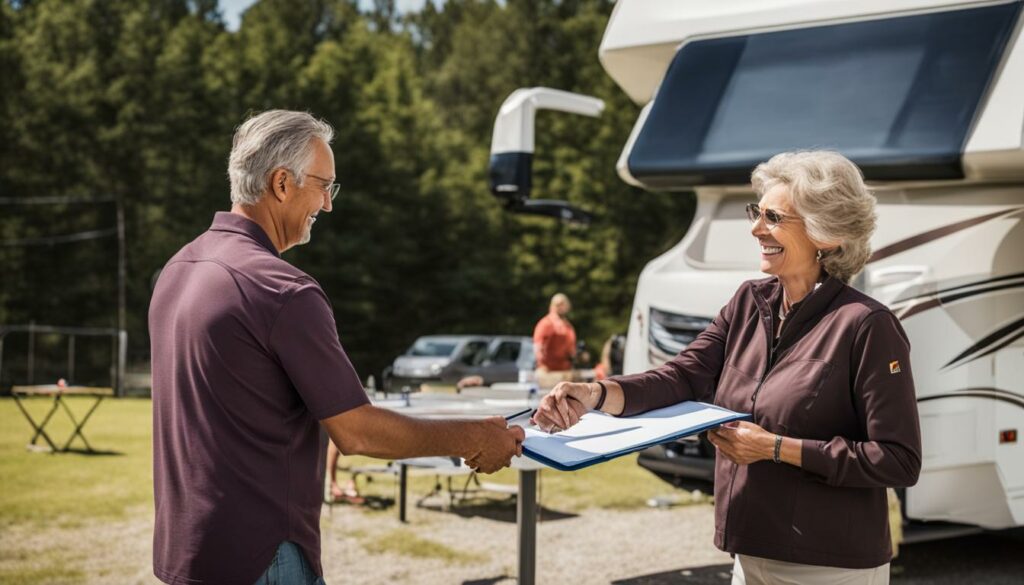
Successful RV park operators understand the importance of negotiating win-win agreements with suppliers to establish long-lasting partnerships that deliver value to both parties. By working together towards mutual success, both the RV park and its suppliers benefit from the resulting synergy and increased profits.
To maximize results, expert supplier relationship strategies for RV parks include careful planning, effective communication, and crafting solutions that meet the needs of both parties. Below are some tips on how to achieve a win-win outcome:
- Understand the supplier’s perspective: Take the time to understand your supplier’s business model, goals, and challenges. By understanding the supplier’s perspective, you can identify potential areas of synergy and work together to create mutually beneficial solutions.
- Define your objectives: Clearly define your objectives and communicate them to your supplier. This helps to ensure that both parties are working towards the same set of goals and priorities.
- Be creative: Brainstorm innovative solutions that meet the needs of both parties. This involves exploring solutions that may not be apparent at first glance, which can lead to new opportunities for growth and success.
- Focus on long-term value: Avoid short-sighted decisions that may provide immediate cost savings but could harm the long-term relationship with your supplier. Focus on creating sustainable solutions that deliver long-lasting value for both parties.
- Communicate openly: Maintain open and transparent communication channels with your suppliers. Listen to their concerns and be receptive to feedback. This can help to build trust and foster a collaborative working relationship.
By following these supplier relationship strategies for RV parks, you can establish strong partnerships with your suppliers that deliver long-term success. Negotiating win-win agreements with suppliers allows you to maximize value, achieve common goals, and drive operational excellence.
Leveraging Technology for Supplier Relationship Management
With the increasing complexity of supplier relationships in the RV park industry, technology has become a critical tool for managing these partnerships. RV park supplier management has been made easier and more efficient thanks to automation, data analytics, and digital platforms.
Automated communication tools can help keep suppliers informed about inventory levels and help them prepare for any changes in demand. By providing suppliers with real-time data, RV park managers can ensure that they are always up-to-date on their inventory and operating costs.
Data analytics can help managers make better decisions about suppliers, such as which suppliers have the highest quality products and services, which ones are most reliable, and which ones offer the best value. This can help RV park managers optimize their supplier partnerships to improve operations and guest satisfaction.
Digital platforms for RV park supplier management can provide a centralized location for managing all supplier communications, contracts, and performance evaluations. These tools can automate workflows, track compliance, and standardize supplier communications. This can help RV park managers save time, reduce errors, and ensure consistency across all supplier relationships.
Overall, leveraging technology for supplier relationship management in RV parks can help managers streamline processes, ensure consistency, and optimize supplier partnerships. To achieve the full benefits of technology, however, RV park managers must invest in the right tools and adopt best practices for managing their technology-enabled supplier relationships.
Continuous Improvement and Innovation in Supplier Relationships
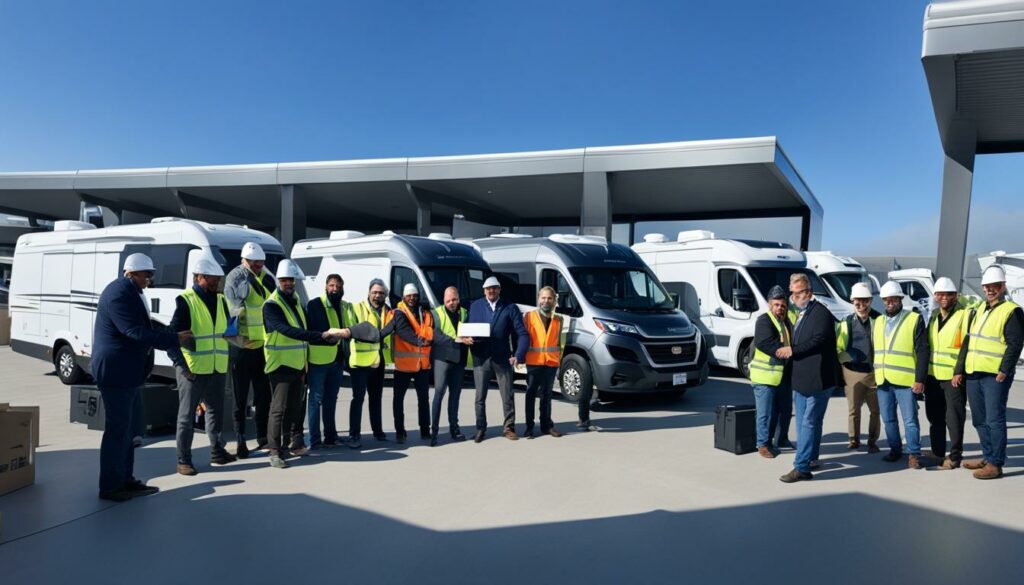
Successful RV park operations rely heavily on strong partnerships with suppliers. To enhance supplier partnerships in the RV park industry, owners and operators must embrace a culture of continuous improvement and innovation. By regularly reviewing and refining processes, RV parks can stay ahead of the competition and deliver exceptional guest experiences.
One area where RV parks can focus their innovation efforts is in exploring new product and service offerings from suppliers. For example, partnering with a technology provider to introduce new guest check-in software can lead to faster, more efficient processes and a better guest experience.
Another key element of continuous improvement in supplier relationships is leveraging data. By tracking supplier performance metrics, RV parks can identify areas for improvement and work with suppliers to implement changes that benefit both parties. Whether it’s negotiating better prices or improving delivery timelines, RV parks can achieve significant operational efficiencies by continuously evaluating and improving supplier partnerships.
Finally, innovation in supplier relationships can mean exploring new partnerships altogether. RV park operators should regularly evaluate their supplier base and consider new partnerships that could bring new opportunities for growth and improved guest experiences. By keeping an open mind and staying attuned to market trends, RV parks can form strategic supplier relationships that drive success.
Conclusion
In conclusion, building strong supplier relationships is vital for the success of RV parks. It is an ongoing effort that requires continuous attention and effort. By understanding the role of RV park suppliers and managing the relationship effectively, RV park owners and operators can drive operational excellence and deliver exceptional guest experiences. Selecting the right suppliers, establishing clear expectations, fostering effective communication, building trust and collaboration, and leveraging technology are critical strategies for enhancing RV park supplier partnerships. It is equally important to evaluate vendor performance and negotiate win-win agreements to achieve mutually beneficial outcomes. Finally, embracing a culture of continuous improvement and innovation can help RV park owners and operators stay ahead of the curve. By prioritizing supplier relationships, RV parks can establish competitive advantages, enhance guest satisfaction, and achieve long-term success.
RV park supplier relationships are the cornerstone of operational excellence and exceptional guest experiences. By investing in these relationships, RV park owners and operators can drive success and growth. Therefore, it is essential to prioritize supplier relationships and cultivate strong partnerships. With the strategies and best practices outlined in this article, RV park owners and operators can optimize supplier relationships and establish a sustainable competitive advantage.
FAQ
Why are strong supplier relationships important for RV park success?
Building strong supplier relationships in the RV park industry is crucial for several reasons. Firstly, suppliers play a critical role in ensuring smooth operations and delivering quality products and services to guests. A strong relationship with suppliers can lead to reliable and timely deliveries, helping to maintain a well-stocked and efficient park. Additionally, suppliers can offer valuable insights into industry trends, innovations, and cost-saving opportunities. Finally, building strong supplier relationships can result in favorable terms and pricing, contributing to the overall profitability of the RV park.
What is the role of RV park suppliers?
RV park suppliers provide essential products and services that contribute to the successful functioning of an RV park. These suppliers can range from those providing food and beverage supplies to those offering maintenance, equipment, or recreational amenities for RV park guests. They play a crucial role in ensuring the park has the necessary resources to operate smoothly and meet the demands and expectations of its guests. By establishing partnerships with reliable suppliers, RV park operators can ensure the infrastructure, services, and experiences they offer are of high quality and aligned with guest preferences.
How can RV park operators effectively manage supplier relationships?
Managing supplier relationships in an RV park setting requires a proactive and collaborative approach. Clear and open communication is key, including setting expectations, discussing performance metrics, and providing feedback. It’s essential to understand suppliers’ capabilities and limitations and align them with the park’s goals and requirements. Regular performance evaluations and vendor assessments can help identify areas for improvement and foster continuous improvement. Additionally, establishing trust and building long-term partnerships can lead to mutually beneficial outcomes for both the RV park and its suppliers.
What should RV park operators consider when choosing suppliers for their park?
When selecting suppliers for an RV park, operators should consider factors such as quality, reliability, price competitiveness, and customer service. It’s important to evaluate potential suppliers based on their track record, including references and reviews from other clients. Assessing their financial stability and ability to fulfill orders consistently is crucial to ensure a reliable supply chain. Moreover, considering the compatibility of the supplier’s offerings with the park’s target market and guest preferences can help enhance the overall guest experience.
How can RV park operators establish clear expectations with their suppliers?
Establishing clear expectations with suppliers is essential in order to align their services with the park’s needs. This can be achieved through the use of service level agreements (SLAs) that outline performance metrics, delivery timelines, quality standards, and other relevant criteria. By clearly defining these expectations, both parties can have a shared understanding of what is required and ensure that there is no ambiguity or room for miscommunication. Regular reviews and feedback sessions can also help reinforce and adapt these expectations as needed.
What are some effective communication strategies with RV park suppliers?
Effective communication with RV park suppliers is critical for maintaining strong relationships. It’s important to establish regular communication channels, such as meetings, phone calls, or email updates, to keep suppliers informed about any changes, requirements, or concerns. Being responsive and timely in addressing queries or issues raised by suppliers can promote a culture of trust and collaboration. Providing feedback on performance or sharing industry insights can also demonstrate the value placed on the supplier’s contribution and foster a mutually beneficial partnership.
How can trust and collaboration be built with RV park suppliers?
Building trust and collaboration with RV park suppliers requires consistent and transparent communication, fair and ethical business practices, and delivering on commitments. Consistently paying invoices on time, acknowledging the supplier’s expertise and contributions, and involving them in relevant decision-making processes can help foster a sense of partnership. Sharing information on upcoming projects or changes within the park and seeking input or suggestions from suppliers can also demonstrate openness and a willingness to work together towards common goals.
How can RV park operators evaluate vendor performance and manage their vendors effectively?
Evaluating vendor performance and implementing effective performance management processes can help RV park operators ensure that suppliers are meeting expectations. This can include setting performance metrics and regularly reviewing them, conducting vendor assessments through surveys or site visits, and providing constructive feedback on areas for improvement. Having open and transparent communication channels where concerns or issues can be raised and addressed promptly is also essential. Implementing continuous improvement programs and recognizing exceptional performance can further incentivize vendors to excel.
What are some strategies for negotiating win-win agreements with RV park suppliers?
Negotiating win-win agreements with RV park suppliers involves finding common ground and mutually beneficial solutions. It’s important to approach negotiations with a collaborative mindset and seek to understand the supplier’s needs and constraints. Identifying shared goals and exploring creative solutions can help create win-win outcomes. Negotiating on factors other than price, such as quality, delivery terms, or additional value-added services, can provide opportunities for both parties to derive value from the agreement.
How can technology be leveraged for supplier relationship management in RV parks?
Technology can play a crucial role in streamlining supplier relationship management in RV parks. Implementing digital platforms or automation tools can simplify processes such as order placement, invoicing, and inventory management. Data analysis can provide insights into supplier performance and identify opportunities for cost savings or operational efficiencies. Furthermore, technology can facilitate communication and collaboration, allowing for real-time updates, document sharing, and performance tracking.
How can RV park operators foster continuous improvement and innovation in their supplier relationships?
RV park operators can foster continuous improvement and innovation in their supplier relationships by encouraging open dialogue and actively seeking feedback from suppliers. Regularly evaluating current practices and looking for ways to improve efficiency or enhance the guest experience can drive innovation. Exploring new technologies, market trends, and alternative suppliers can also help identify opportunities for improvement or innovation. By embracing a culture of continuous improvement, RV park operators can stay ahead of the competition and deliver exceptional experiences to their guests.
Why is it important to maintain strong supplier relationships in the RV park industry?
Maintaining strong supplier relationships in the RV park industry is crucial for sustained success. Suppliers are integral to the day-to-day operations of an RV park, providing essential products and services that contribute to guest satisfaction. By nurturing strong relationships with suppliers, RV park operators can ensure reliable and timely deliveries, access to the latest industry trends and innovations, favorable pricing and terms, and a collaborative partnership built on trust and mutual benefit. These factors collectively contribute to operational excellence, cost efficiencies, and the ability to provide exceptional guest experiences.
